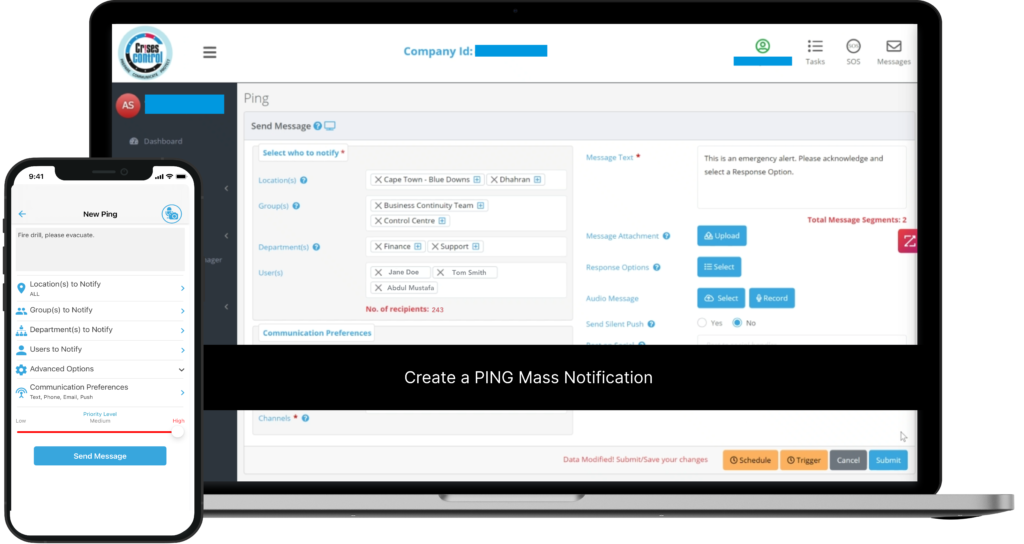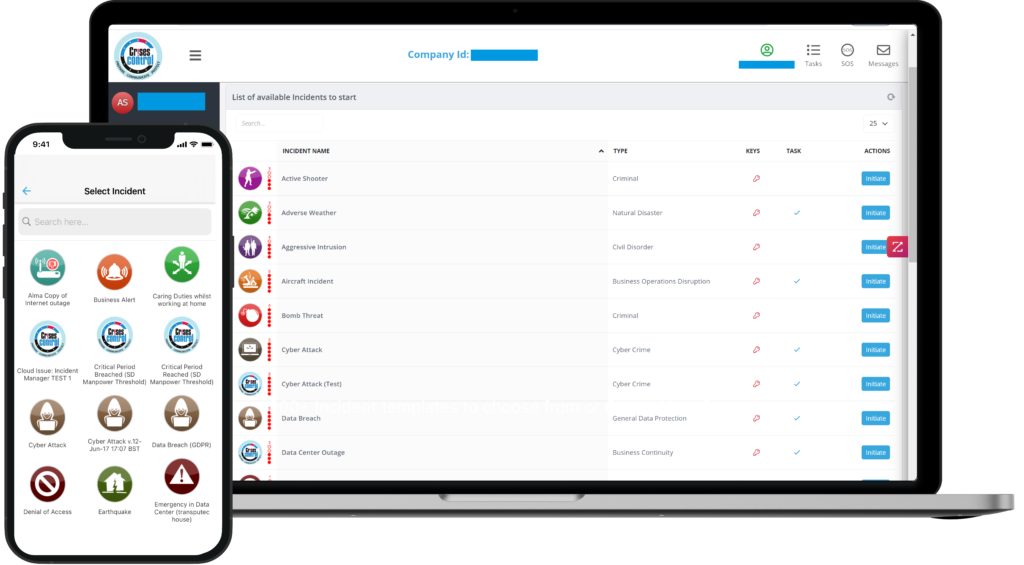Written by Anneri Fourie | Marketing Executive
In today’s fast-paced business environment, a robust Mass Communication System is vital, not just for handling emergencies, but for enhancing everyday operations and ensuring seamless business continuity. While many organisations focus on the emergency capabilities of these systems, understanding their broader applications can transform day-to-day activities, streamline processes, and fortify operational efficiency.
This blog explores the everyday benefits of a Mass Communication System and highlights how Crises Control’s solutions can revolutionise your business continuity strategy.
Understanding a Mass Communication System
A Mass Communication System (MCS) is designed to facilitate the rapid and efficient dissemination of information to large audiences. It integrates multiple communication channels, such as email, SMS, voice messages, and mobile apps, ensuring that messages are delivered promptly and reliably. This system is not only crucial for managing emergencies, but also plays a significant role in everyday business operations.
Key Features of an Effective Mass Communication System
1. Multichannel Communication
An effective MCS utilises various platforms to ensure that messages reach different audience segments through their preferred channels. This flexibility helps in addressing diverse communication needs within an organisation.
2. Real-Time Alerts
Immediate notifications are essential for keeping everyone informed about urgent updates, whether they’re related to an emergency or a significant operational change.
3. Scalability
An MCS must be scalable to adapt to the communication needs of both small and large organisations. It should efficiently handle communication requirements, regardless of the scale of operations.
Enhancing Daily Operations with a Mass Communication System
Beyond its emergency management capabilities, an MCS offers numerous advantages for everyday business operations. Here’s how integrating an MCS into your business can enhance your daily activities:
Streamlined Internal Communication
Effective internal communication is the cornerstone of a successful organisation. An MCS streamlines internal communication by offering:
1. Real-Time Updates
An MCS ensures that your team receives timely updates about important changes, project statuses, and organisational announcements. This reduces the risk of miscommunication and keeps everyone on the same page.
2. Efficient Collaboration
Facilitates seamless collaboration by providing instant messaging and notification capabilities. Teams can quickly share information, coordinate tasks, and resolve issues without delays.
3. The Crises Control Advantage
Crises Control’s Ping Mass Notification feature exemplifies real-time communication across various channels, ensuring that all team members are consistently updated and engaged.
Interested in our Ping Mass Notification Software?
Efficiently alert everyone in seconds at scale with our Mass Notification System – PING, get the message out fast and ensure rapid response and recovery.

Efficient Incident Reporting
Not all incidents are emergencies; some require prompt attention to prevent minor issues from escalating. An MCS allows for effective reporting and management of everyday issues:
1. Minor Disruptions
Easily report and address minor disruptions such as equipment failures or maintenance needs. An MCS enables quick reporting, reducing downtime and ensuring that operational efficiency is maintained.
2. Incident Tracking
Track and manage incidents systematically to resolve issues promptly. This minimises the impact on operations and enhances overall productivity.
3. How Crises Control can Help
With Crises Control’s Incident Manager system, you can efficiently track and address minor incidents, ensuring that your daily operations run smoothly.
Supporting Employee Safety and Well-being
Employee safety and well-being are paramount, and an MCS plays a crucial role in maintaining these aspects beyond crisis situations:
1. Health and Safety Alerts
Regular updates on health and safety protocols are essential. An MCS helps communicate new safety policies, health guidelines, and emergency procedures effectively.
2. Employee Assistance Programs
An MCS can disseminate information about health programs, counselling services, and other support resources, keeping employees informed and engaged.
3. The Benefit of Using Crises Control
Crises Control’s SOS Panic Button and Task Manager features enhance workplace safety by allowing employees to report safety concerns quickly and manage assistance programs effectively.
Improving Customer and Stakeholder Communication
Effective communication extends beyond internal operations to include interactions with clients and stakeholders:
1. Client Updates and Notifications
Maintain transparency with clients by notifying them about service changes, updates, and disruptions. Efficiently collect and act on client feedback to improve services.
2. Stakeholder Engagement
Regularly update stakeholders, including investors and partners, on important developments. Manage communication during crises to maintain trust and confidence.
3. How Crises Control Helps
Crises Control’s Incident Plan Builder and Reporting features ensure that clients and stakeholders receive timely updates and maintain transparency.

Interested in our Incident Management Software?
Customise your Crisis Incident Management Software to meet your specific needs with our flexible tools & stay connected and informed during the crisis and incident management process
Boosting Business Continuity Planning
A Mass Communication System is an essential tool for robust business continuity planning. Here’s how it contributes:
1. Regular Drills and Training
Integrate communication into your training programs by scheduling and managing drills through the MCS. Evaluate the effectiveness of these drills to ensure continuous improvement.
2. Testing and Reviewing Continuity Plans
Regularly test and review your business continuity plans. Conduct simulation exercises to assess the effectiveness of your plans and gather feedback for improvements.
3. The Crises Control Advantage
Crises Control’s Easy Integration and Incident Management features support the incorporation of MCS into training programs and ensure that business continuity plans are tested and updated effectively.
Case Study: Crises Control in Action
Example 1: Streamlined Internal Communication
A multinational corporation utilised Crises Control’s Ping Mass Notification and Incident Management tools to enhance internal communication. The integration of these tools resulted in reduced communication delays and improved team coordination.
Example 2: Enhancing Employee Safety and Well-being
A large organisation adopted Crises Control’s SOS Panic Button and Task Manager to improve workplace safety. This implementation led to faster response times during safety incidents and more effective management of employee assistance programs.
Interested in Crises Control's Success Stories?
Conclusion
A Mass Communication System is not just a tool for emergencies, but a powerful asset for enhancing everyday business operations and ensuring business continuity. By leveraging Crises Control’s advanced features, you can improve internal communication, support employee safety, engage clients and stakeholders, and boost overall operational efficiency.
Discover how Crises Control can transform your business continuity strategy. Contact us to get a free demo and see firsthand how our solutions can benefit your organisation.
Request a FREE Demo

